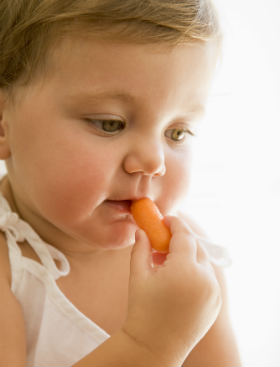Whilst absorbing the excitement of your baby starting solids, you might be surprised at how much you will start thinking, talking and worrying about his/her poop. Having made the transition to solid foods, it is unfortunate that some babies do not respond well to solids, resulting in constipation.
What are the main causes of constipation after starting solids? The short answer is that it could be due to several reasons. Baby constipation can result from insufficient fluid intake, a low fiber diet, excess starch in diet, formula fed foods among many others. To help your baby with constipation, give him enough fluids, try bowel massage and movement, dietary modifications, and laxatives as the last option.
Can Introducing Solids Cause Constipation?
This is a definite yes. Introducing solid foods to your baby can result in constipation. You should expect some changes in your baby’s poop after introducing solid foods. The changes could be in its odor, frequency, amount or color.
Besides, you shouldn’t worry if you find some chunks of food in your baby’s diaper. All are part of the baby elementary system’s learning and adapting to new whole foods. Besides, the baby’s digestive system is not mature enough to form an actual stool.
This involves compacting the fecal matter and reabsorbing water for a better stool formation. These changes result in reduced bowel movements and skipping poop days may become normal for the baby.

Causes of Constipation After Starting Solids
When a baby feeds only on your breast milk, it is normal if they poop more than once daily. This is because there isn’t a lot of work involved in breaking down, digesting and absorbing liquid milk. However, once solid foods are introduced, they bring along their fibers and other components that require more digestion.
That said, if your baby is constipated after feeding on solids, it could be due to the reasons mentioned above. This is a common source of worries, especially for new parents who don’t know how to help a baby who’s having trouble pooping.
As for the foodstuffs, including the following in your baby’s diet can result in constipation.
- Low-fiber diet
- Eating a lot of starchy foods such as cereals, carrots, cheese, and bananas.
- Naturally less bowel movements
- Slight metabolic disorders
- Drinking less fluids
- Formula fed foods
- If your baby isn’t comfortable using new toilets
- If the toddler is holding their stool

4, 5, 6 Month Old Baby Not Pooping After Starting Solids. What to do to Help?
To relieve the discomfort that comes with constipation, there are several natural remedies and treatment modalities that can help your baby poop. Among them, include;
Offer your toddler water frequently
Ideally, your toddler should take some water after eating solid foods besides the milk feeds they are still feeding on.
Diluted prune juice
This is vital if the baby doesn’t like water. The juice should be mixed with water in the ratio of 1 part to 10 parts of water.
Offer your baby enough servings of fruits and vegetables
Fruits and vegetables contain enough fiber that prevents constipation. They aid in proper digestion of food.
Baby formula can also help in easing constipation
They work by softening the baby’s stool. They can be administered daily until the situation resolves.
Move or swirl your toddler’s legs
Do this in a circular way, as if they are cycling, to activate their bowels.
Extending tummy-time periods
Extending tummy periods with your baby is believed to assist in bowel stimulation. This increases bowel movements resulting in pooping. You can also massage the baby’s stomach with a moisturizer or warm olive oil or give your baby a warm bath to relax and release any abdominal muscle tension.
If the natural remedies and other constipation relief measures don’t work, you can opt for medicinal laxatives and suppositories that relieve constipation. Whereas these medicinal supplements are available in the nearest chemist over the counter, you shouldn’t use them before consulting a pediatrician.
What to Feed to Help Your Baby to Poop?
If your baby becomes constipated because of starting on solids, consider feeding your baby with the following foods.
Iron food and supplements
Introduce your baby to foods rich in iron. This is an important nutrient in complementing the effects of solid foods. Your baby could be sensitive to iron-enriched infant cereals and may constipate. Therefore, it is prudent if you vary iron food sources to foods such as eggs, meat, fish, legumes, beans, and nut butter.
As for the supplements, if your baby is on supplementation iron, consult your doctor about changing the dosage. Check on the pros and cons of continuous iron supplementation and make some adjustments to ensure your baby gets enough iron without instilling constipation.
Fibers including vegetable and fruits
Whereas foods rich in iron are important, fruits and vegetables should be part of your baby’s meal. They contain vitamin C, which complements the absorption of iron. They are also rich in fiber, a component that prevents constipation.
There are multiple sources of fiber apart from fruits and vegetables. You can try out ground seeds, toasted bread, beans, and cooked legumes. They are not only good solid foods to introduce to your infant but are also nutritious.
Apples and pears also contain fibers that help soften the stool. It does so by drawing water from the gut, making it easier to pass. Prunes and prune juice are also good laxatives due to their high fiber, fructose, and sorbitol content. They help relieve occasional constipation.
Fluid – water and breast milk

You should continue feeding your baby with breast milk or formula as well with water. This will help mobilize the baby’s stomach contents. It is recommended that you introduce cow milk to your baby at around 9 months. Therefore, stick to breast milk during the transition.
What Foods to Avoid to Minimize Constipation?
Once you notice that your baby is constipated, think of what you have fed your baby before. Ask yourself if you have introduced any new foods that may have led to constipation. Well, this might be nothing serious but a sign that your baby is sensitive to specific foods.
In such a case, avoid feeding the baby until constipation is resolved. You should then feed the baby the same food in small bits and watch out if constipation re-arises again. If it happens, find an alternative for that food. You can as well consult a dietician about this. Some babies are sensitive and can constipate by eating specific foods.
FAQ
How long can a baby on solids go without pooping?
Initially, any breastfed baby would normally pass bowels up to four times a day. However, once introduced on solids, the baby can go up to 2 days without pooping. The reason, as explained before, is the change in bowel movements associated with solid foods.
These changes are normal and expected. You shouldn’t worry but seek the necessary alternative measures to relieve the baby’s constipation.
Do carrots cause constipation in babies?

Carrots are full of fiber and are part of the advised healthy diet that can improve bowel motility for every person. They contain beta-carotene that is a plant form of vitamin A.
Due to this, they make an excellent weaning food for babies. Besides, babies like their naturally sweet taste. This is possible only if eaten raw. However, cooked carrots can result in constipation in infants.
Does banana cause having trouble pooping?
Bananas are perhaps worlds’ popular fruits. They make a convenient snack and healthy. However, this might not be true for weaning babies. It is believed that bananas are rich in fiber, a component thought to prevent and relieve constipation.
However, some people believe that bananas may cause constipation. Though the claims are not substantiated, some researchers found that some banana component was responsible for constipation in both infants and adults.
Why do a baby cry when pooping after starting solids?
It is normal for babies to cry when pooping, especially after starting on solids. This basically comes down to the effect of solid foods and constipation. As explained earlier, solid foods slow down digestion and result in semi-solid poop.
This could be the reason your baby is crying every time he/she poops. This condition is occasioned by dyschezia, a situation where your baby takes more than 10 minutes straining and crying when passing stool.

Conclusion
So, how do you relieve constipation in babies after starting solids?
Constipation is very common in infants and children. For many, it is always not clear why they become constipated. However, for those just starting out on solids, the new diet could be the reason why. This is why, as a new parent, you shouldn’t worry too much as it will likely happen not and then.
You should monitor your baby for the various signs of constipation frequently. Some vivid signs of constipation include;
- Excessive crying and unusual discomfort.
- Irritability and pain when going to poo.
- Dry and hard poo in the baby’s diaper.
- Slight blood stains in the baby’s nappy.
- Abrupt loss of appetite.
- Abnormally hard belly.
You might be surprised to hear that runny poo can also signify constipation. You should also note that constipation could indicate a medical condition such as digestive system problems. Don’t be worried though, as such conditions affect less than five percent of babies. Nonetheless, it is easily diagnosed by medics and treatable.
For diet change-related constipation, try bowel massage and movement, dietary modifications, extra fluids, and laxatives as the last option.

